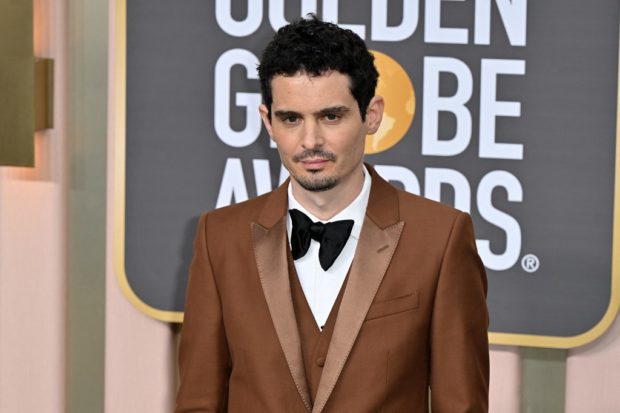
In this file photo taken on Jan. 10, 2023, French film director Damien Chazelle arrives for the 80th annual Golden Globe Awards at The Beverly Hilton hotel in Beverly Hills, California. Damien Chazelle’s new film pulls zero punches in its drug-addled, vomit-splattered vision of Hollywood’s early years, and the French American filmmaker laments that today’s industry has lost some of its wild side. FREDERIC J. BROWN / AFP
PARIS—Damien Chazelle’s new film pulls zero punches in its drug-addled, vomit-splattered vision of Hollywood’s early years, and the French American filmmaker laments that today’s industry has lost some of its wild side.
Chazelle burst onto the scene with “Whiplash” (2014) and “La La Land” (2016), the latter making him the youngest-ever recipient of the best director Oscar at 32.
He returns with “Babylon,” which rolls out around the world next week, starring Brad Pitt and Margot Robbie as stars in the early days of Hollywood.
It is a visually orgiastic film that serves as a sort of dark and hedonistic retelling of “Singin’ in the Rain” and the shift from silent movies to the era of sound.
“In the 1920s, the rules were not yet completely written, cinema was still in its youth,” said the American-born Chazelle, who spoke to AFP in fluent French during a recent visit to Paris.
“We don’t really know this period, just before the arrival of sound, when there was a freedom that we would normally associate more with the 1960s,” he said.
Film sets of the time were “perhaps a little more brutal, a little more violent, a little darker, but also comical.
“There was something rich and complex in it that inspired me.”
There are parallels to the tumult in today’s Hollywood, as streaming platforms and the pandemic have put cinemas in jeopardy and led to Hollywood relying on tried-and-tested franchises and superheroes.
“We are really at a crossroads,” said Chazelle.
“Today in Hollywood there’s a lot of fear, and not a lot of people taking risks. There are always great movies being made, thankfully, but it’s a time of fear.”
‘Like a drug trip’
As “Babylon” makes clear, Chazelle has a deeply romantic love for the big screen.
He has tried his hand on a streamer, directing the series “The Eddy” about a Parisian jazz club for Netflix.
“But the big screen is always something different—an experience that is not interrupted, not divided into chapters,” he said.
“It’s a bit like a drug trip—when you leave the cinema, the world looks different, something is changed.”
Despite the huge success of “La La Land,” “Babylon” was a tough project to get off the ground, with a budget estimated at around $80 million thanks to its extravagant sets and hundreds of extras.
“Thirty or 40 years ago, it was not uncommon to see films like this. But financing this type of film is not so easy today and it’s becoming more and more difficult—so it’s more and more important to show that it can still exist.
“The challenge today is to do something that justifies the big screen, as we can’t put just anything up on it. We have to fight for this privilege.”
For all the challenges, Chazelle retains a sort of morbid optimism about the industry.
“People die, but Hollywood, industry and art don’t die, that’s the irony.
“It’s been 100 years that we’ve been saying cinema will soon die, or that it’s already dead, but cinema and art are a story of death and rebirth, they are cycles.” /ra
RELATED STORIES:
Damien Chazelle exposes 1920s Hollywood hedonism with ‘Babylon’
‘La La Land’ director Chazelle’s new flick to open Venice festival